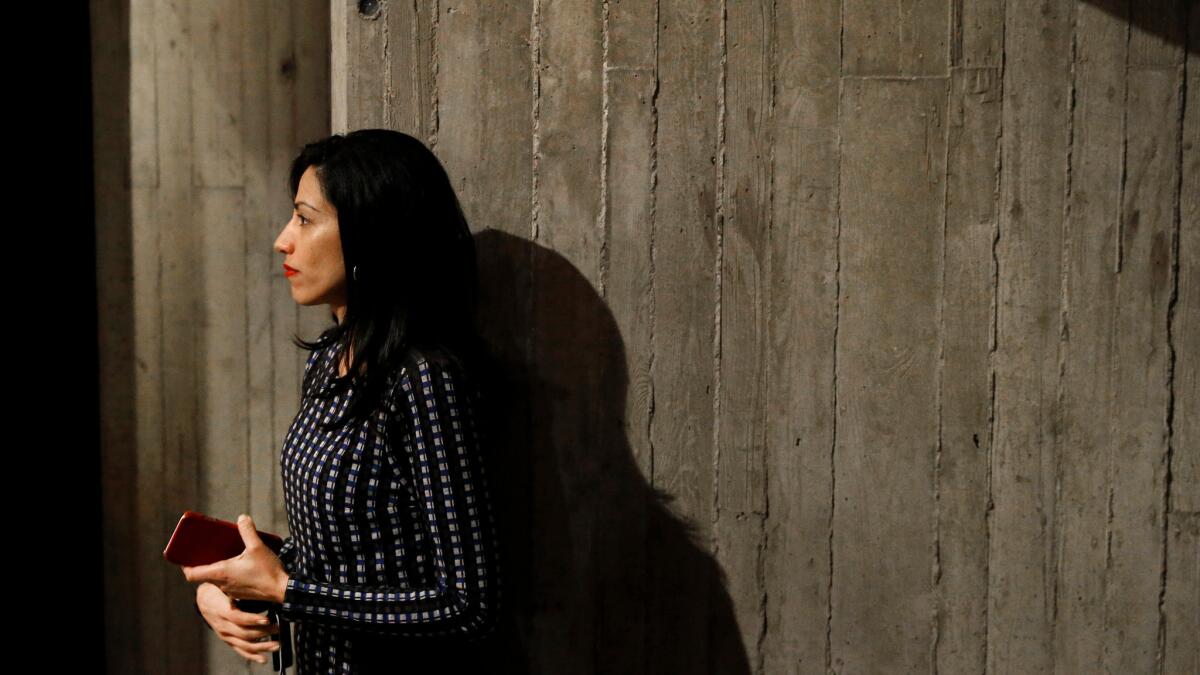It would take a bombshell for FBI to charge Clinton in email case, experts say

Reporting from Washington — Even if FBI agents discover classified information on a newly seized laptop, Hillary Clinton is unlikely to face criminal charges, according to legal experts and former federal prosecutors.
That’s largely because the Justice Department and FBI Director James B. Comey have already declined to prosecute based on a legal conclusion that there was no evidence that Clinton and her aides intended to violate laws governing the handling of classified information, a key element of such a criminal offense.
To change the calculus, the FBI would have to find correspondence that clearly demonstrates Clinton or her aides knowingly broke the law, exchanged materials they knew to be classified or attempted to interfere with the investigation by withholding or destroying evidence, according to former federal prosecutors and legal scholars.
“Such an email itself would have to be one of those things you would be saying, ‘I can’t believe you wrote that down,’” said Roscoe Howard Jr., a former federal prosecutor and U.S. attorney for the District of Columbia during the George W. Bush administration. “I would be shocked if they found such a thing.”
The chances of the bureau missing such evidence after what Comey had described as a comprehensive inquiry would appear to be slight, former prosecutors said.
“Short of a truly inculpatory email, the existence of which I find hard to fathom, I don’t see a situation that comes out of this that justifies the hoopla,” said Stephen Vladeck, a law professor at the University of Texas.
The analysis comes as federal agents and analysts are scrambling to review emails found on a laptop used by former Rep. Anthony Weiner and his estranged wife, Huma Abedin, one of Clinton’s closest aides. Agents came across Abedin’s correspondence while searching the computer for evidence that the disgraced former lawmaker may have violated federal laws when exchanging sexually explicit messages with a 15-year-old girl.
During its nearly yearlong probe, the FBI interviewed dozens of witnesses, conducted forensic tests and examined tens of thousands of messages that passed through the private email server used by Clinton and some of her aides while she was secretary of State. In the end, agents uncovered classified information in 193 emails that were part of 81 email chains, though none of the emails were marked with a classified header. Of those chains, the department concluded that eight should have been treated as top secret, the highest level of classification, the FBI reported.
Election 2016 | Live coverage on Trail Guide | Sign up for the newsletter
“So if there were 100 examples of classified information before and now they find 10 more, how is that going to change the analysis?” asked Peter Zeidenberg, a former federal prosecutor who signed a public letter critical of Comey’s decision last week to publicly reveal the new inquiry. “It’s the same question. It’s the same issue. That’s even assuming the emails they find on the laptop are classified emails. There may all be duplicates, or emails that don’t have any classified information. We don’t know.”
And even if agents discover evidence that warrants an indictment, Comey’s past public statements could undermine a future prosecution, legal experts said.
Defense lawyers would certainly seek all records associated with his public announcement in July, when he declared Clinton’s actions were “careless” but not criminal.
An about-face by the FBI would permit defense attorneys to attack the thoroughness of the entire investigation, pointing out that it failed to turn up Abedin’s emails on a laptop she shared with her husband.
“A classic defense in any criminal case is to accuse the investigating law enforcement agents of ‘shoddy police work.’” said Mary Pat Brown, a former federal prosecutor. “When there are inconsistencies in the evidence itself, or any delays or missteps in collecting evidence, the government’s case is vulnerable to attack.”
Comey’s unusual move to publicly discuss the case with reporters and Congress in July was in part to demonstrate that the bureau’s inquiry was meticulous and independent.
But Vladeck agreed his action could now backfire. “Those statements make it difficult for there ever to be a prosecution,’’ he said. “Comey laid a trap for himself in July.”
Perceptions that the new emails won’t dramatically change the case are part of the reason Clinton supporters were so incensed by Comey’s surprise and vague announcement last week that the bureau would examine the materials over the coming weeks.
Agents are hoping to have a preliminary assessment of the Abedin emails completed by election day, though it remains unclear whether the FBI will make a further public statement about the case, despite calls for more information from both Democrats and Republicans.
Agents will need to sort out Abedin’s emails, discard duplicates and then examine what’s left to see if anything is relevant to the Clinton inquiry, a federal law enforcement official said.
The laptop contains hundreds of thousands of emails — most of them Weiner’s — and it will take weeks to fully vet them, the official said.
Follow @delwilber on Twitter
ALSO:
Tracking down guns used in crimes and terror attacks is still surprisingly low-tech
Aspiring agents learn from mistakes of FBI’s ‘shameful’ investigation of Martin Luther King Jr.
How these Brooklyn prosecutors work to get innocent convicts out of prison
More to Read
Get the L.A. Times Politics newsletter
Deeply reported insights into legislation, politics and policy from Sacramento, Washington and beyond. In your inbox three times per week.
You may occasionally receive promotional content from the Los Angeles Times.











